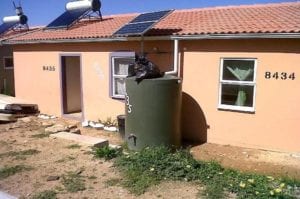Research has shown that harvested rainwater in South Africa potentially poses a health hazard, especially for children and immuno compromised individuals.
Government has invested in installing more than 23 000 rainwater tanks to collect and store rain for use in rural villages. However, a new study from the University of Stellenbosch (US) shows that pathogens regularly inhabit these rainwater tanks. Researchers collected regular water samples from rainwater tanks at the Kleinmond Housing Scheme; a sustainable housing project built and managed by the South African Council for Scientific and Industrial Research and the Department of Science and Technology.The water was found to include Legionella, Klebsiella, Pseudomonas, Yersinia, Shigella, Salmonella and Giardia. Salmonella, which was found in 6% of the samples, indicates human fecal contamination, while Yersinia which was found in 28% of the samples indicates animal fecal contamination. The water in mainly used for washing clothes and house-cleaning, but researchers found that approximately one quarter of the people who use the water also drink it.
The researchers say the risk of drinking contaminated rainwater is the biggest obstacle to expanding sustainable solutions in drought-prone countries like South Africa.






